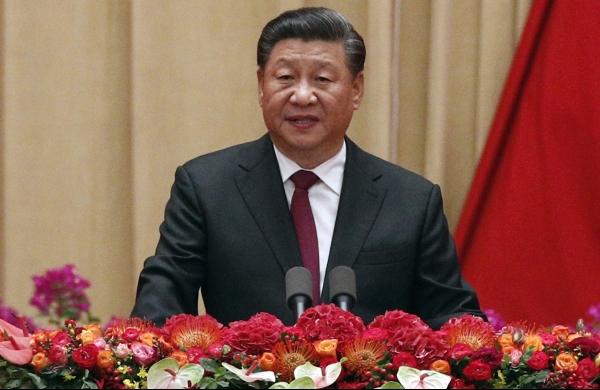Chinese Communist Party Begins Crucial Plenary Session

Image Courtesy: The New Indian Express
Beijing: Over 370 top officials of China's ruling Communist Party on Monday began the much-delayed four-day plenary session, regarded as a politically significant conclave for President Xi Jinping due to the reported ‘unease’ in party ranks over protests in Hong Kong, the trade war with the US and slowdown of the economy. Official media reports, however, said the meeting would focus on more administrative and economic reforms.
The closed door meeting of the plenary, also known as plenum, began Monday morning here with Xi, 66, who emerged as the most powerful leader after Mao Zedong since he came to power in 2012 doubling up as General Secretary of the Communist Party of China (CPC) and head of the military besides Presidency, presenting a work report.
Xi delivered the work report and explained a draft document of the CPC Central Committee's decision on major issues concerning how to uphold and improve the system of socialism with Chinese characteristics and advance the modernisation of China's system and capacity for governance, the state-run Xinhua news agency reported.
While much of the deliberations of the plenum would remain confidential, observers say a host of issues including the prolonged protests in Hong Kong which have entered the 21st week, the phase one deal next month to end the over year-long bruising trade war with the US and continued slowdown of China's economy were expected to figure in the agenda.
On the foreign policy front, informed sources said Xi's recent visit to Mamallapuram for his second informal summit with Prime Minister Narendra Modi is also expected to figure at the meeting.
China is also deeply concerned over the aggressive US policy to strategically contain its efforts to expand global influence through initiatives like the multi-billion-dollar Belt and Road Initiative (BRI).
The plenary session comprising roughly over 370 members of the Central Committee is a high-powered decision making body. It mostly consists of senior party leaders, officials of the military and heads of the state-owned enterprises.
This is the fourth plenary session after the 2017 party congress which ushered in Xi's second term in office. The last plenum was held in February 2018.
The meeting is long overdue as typically CPC holds seven plenums in five years to periodically to review the policies of the leadership.
"It is the first full meeting of the Central Committee in nearly 20 months, the longest interval between two plenums” in recent decades", the Hong Kong-based South China Morning Post reported last week.
Ahead of the meeting, speculation is rife about the lack of shared views among the top echelon of the party about the crisis faced by China on various fronts.
Xi was re-elected for a second five-year tenure last year by the National People's Congress (NPC) which also scrapped the two-term rule for the President, paving the way for his lifelong tenure.
The party's focus in recent months was how to handle the massive protests in Hong Kong.
Hong Kong Chief Executive Carrie Lam, who functioned under the CPC authority, allegedly followed a ‘flip-flop’ policy to deal with the mass protests over the extradition Bill, which sparked fears among local people that those facing criminal charges could be extradited to the mainland.
Lam reportedly first refused to withdraw the Bill and later declared it dead but declined to meet the protestors demand to completely scrap it. As the protests continued, the Lam-led local government last Wednesday officially withdrew the Bill.
Also, the plenary meeting is taking place as China and the US have broadly agreed over the contours of "phase one" deal to end over year-long bruising trade war which negatively impacted China's economy. The phase one deal was expected to be signed next month.
The world's second largest economy in the last several years remained on a slowdown mode.
The talks so far were deadlocked as China resisted US President Donald Trump's demand for intrusive verification mechanism to supervise Beijing's promise for protection of Intellectual Property Rights (IPR), technology transfer and more access to American goods to Chinese markets.
Trump kicked off the trade war in June last year demanding China to reduce massive trade deficit which climbed to over $ 539 billion in 2018.
"The point of this plenum is to institutionalise the party's effort to strengthen its absolute and comprehensive leadership of the country and society since the 19th party congress," political analyst Chen Daoyin told the Post.
Get the latest reports & analysis with people's perspective on Protests, movements & deep analytical videos, discussions of the current affairs in your Telegram app. Subscribe to NewsClick's Telegram channel & get Real-Time updates on stories, as they get published on our website.
























